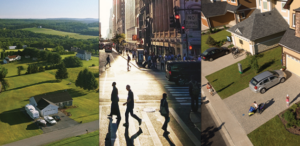In the grand tapestry of life, where we choose to reside can significantly influence our daily experiences and overall lifestyle. Urban and rural areas stand as two distinct realms, each offering a unique set of advantages and disadvantages. Let’s embark on a journey through the contrasting facets of urban and rural lifestyles, unraveling their pros and cons.

Urban Lifestyles
Living in urban areas signifies embracing the vibrancy and dynamism of modern life. The hustle and bustle of city life offer a plethora of opportunities, from diverse career options to a rich cultural scene. In cities, you’re at the epicenter of progress and innovation, surrounded by a hub of activity.
Efficient Public Transportation
One of the most appealing aspects of urban living is the efficiency and accessibility of public transportation. Well-connected subways, buses, trams, and commuter rails provide swift and cost-effective means to navigate the city. This not only reduces the need for personal vehicles but also minimizes traffic congestion and contributes to a greener environment.
Abundance of Shopping and Dining Options
Urban centers boast an extensive array of shopping malls, boutique stores, supermarkets, and local markets. Whatever you need, whether it’s high-end fashion, organic produce, or unique handicrafts, you can find it within the city. Additionally, the diverse culinary landscape offers an unparalleled choice of restaurants, cafes, and eateries serving cuisines from around the world, catering to every palate and craving.
Top-notch Healthcare Facilities
Urban areas are equipped with state-of-the-art medical facilities, renowned hospitals, specialized clinics, and research centers. Access to exceptional healthcare services ensures prompt medical attention and a wide range of treatment options. Moreover, urban living often means proximity to medical professionals and specialists, contributing to overall health and well-being.
Educational Institutions and Learning Opportunities
Urban living is an educational haven, with an abundance of schools, colleges, universities, and research institutions. The concentration of educational hubs means access to a spectrum of academic programs and extracurricular activities. Whether pursuing formal education or seeking skill development, urban areas provide a wealth of learning opportunities.
Cultural and Recreational Events
Cities are cultural melting pots, offering a vibrant tapestry of events and entertainment. Theatres, galleries, museums, music concerts, festivals, and sporting events are a regular part of urban life. Whether you’re an art enthusiast, a music lover, or a sports fanatic, the cityscape is brimming with entertainment options to cater to every interest.
In essence, urban living encapsulates a world where convenience, variety, and opportunities converge to create a dynamic and fulfilling lifestyle. The interconnectedness of services and the richness of experiences in urban areas make it an appealing choice for many individuals seeking a bustling and vibrant way of life.
Pros of Urban Living
Urban living is synonymous with a bustling and convenient lifestyle, where every aspect of daily life is seamlessly integrated for optimal comfort and accessibility.
Cons of Urban Living
However, the rapid pace of urbanization comes at a cost. The soaring cost of living, high property prices, and increased competition for jobs can be overwhelming. The urban lifestyle often entails long work hours, leading to stress and a struggle to strike a work-life balance.
Rural Lifestyles
On the flip side, rural living offers a tranquil escape from the chaos of city life. Surrounded by nature, rural areas provide a peaceful environment, fostering a deeper connection with the natural world.
Pros of Rural Living
Rural living offers a closer-knit community, where people often know each other, fostering a sense of belonging and solidarity. The abundance of green spaces and fresh air contributes to a healthier lifestyle, promoting physical and mental well-being.
Cons of Rural Living
However, rural living comes with its set of challenges. Limited access to amenities and services, fewer career opportunities, and potential isolation can pose hurdles. The slower pace of life may not suit individuals accustomed to the fast lanes of urbanity.
The Hybrid Lifestyle
Some individuals opt for a blend of both worlds, combining the tranquility of rural living with the opportunities of urban proximity. This hybrid lifestyle allows for the best of both realms, offering a peaceful home base while ensuring accessibility to urban amenities.
Factors to Consider
When contemplating the choice between urban and rural living, factors such as career aspirations, family needs, personal preferences, and financial considerations play a significant role. Evaluating these aspects can guide you towards a lifestyle that aligns with your goals and values.
Conclusion
In this exploration of urban and rural lifestyles, we’ve discovered the merits and drawbacks of each. Whether you thrive amidst the skyscrapers and constant buzz of the city or prefer the tranquility of nature and close-knit communities, your lifestyle choice is a canvas waiting for your unique strokes of living.


